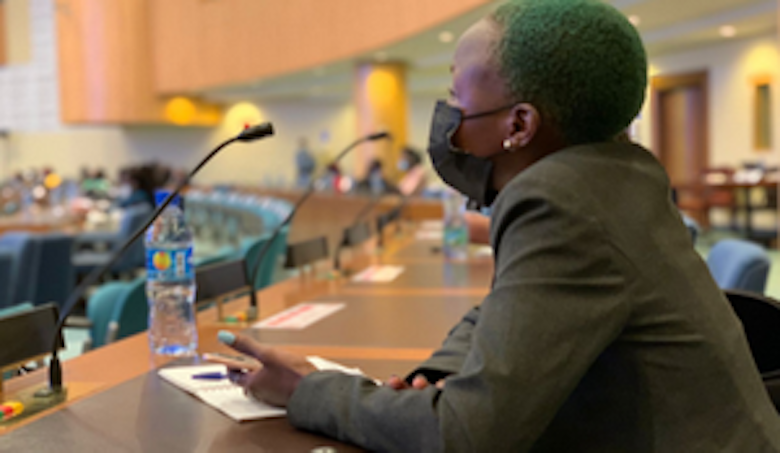Gender Equality in Agriculture and Nutrition: Creating Space for International, Youth-Led Advocacy
Globally—but particularly in Sub-Saharan Africa—women play a massive role in food production and the agricultural labor force as a whole. But women are often overlooked as key actors in food security and production, mostly due to the gendered barriers they face in owning land, pursuing educational opportunities, and access to market and financial resources. This, paired with high levels of unpaid agricultural and caregiving work, invisibilizes them and their critical role in creating and sustaining healthy, thriving communities and combating food insecurity and environmental degradation.
Advocacy
Advocate, passionate feminist, and long-time Girl Up Initiative Uganda mentee, Aromorach Fancy Sheila, was invited to represent Terre des Hommes Netherlands under the She Leads Project, at the 38th annual Gender is My Agenda Campaign (GIMAC) Pre-Summit Meeting in Addis Ababa, Ethiopia the first week of February. This meeting was facilitated by the African Union to discuss gender mainstreaming in the agriculture sector and maternal and neonatal mortality reduction through nutrition under the overarching theme: Advancing Women's Access to Economic Resources to Build our Continent’s Resilience in Nutrition. This unique opportunity brought together African Union member states to share country perspectives surrounding issues robbing girls and young women of full enjoyment of their rights and freedoms, as well as reflections from young women advocates across the continent.
Citizens should own the law—not the state only
During this week-long event, Fancy attended the GIMAC Training of Young Women and Girls, a capacity-strengthening session aimed at growing the advocacy and lobbying potential of young, African leaders. As a recent law school graduate, she was interested in learning about the laws in place under the Maputo Protocol, which states that access to nutritious food is a protected human right (Article 15; Right to Food Security). She and her colleagues discussed the gaps in the implementation of existing laws and noted that theory does not protect against food insecurity, especially for vulnerable women and girls living in resource-scarce communities. Collectively, they recognized and agreed that most people do not have a basic understanding of laws and policies, and therefore cannot use them to their benefit.
Fancy shared, “Citizens should own the law—not the state only. This is best practiced by continuously sensitizing people about human rights and the laws that are there to protect them.” A key suggestion was to use cross-cutting data and research to improve institutional memory, as data is used to influence policies and best practices.
The official pre-summit events covered a variety of topics, ranging from the impacts of unpaid care and domestic work to gender transformative climate actions, to sexual and reproductive health and its relationship with nutrition outcomes. Conversations focused on building a resilient Africa through gender inclusion, and how this would directly benefit education, nutrition, food security, and health initiatives as a whole. Fancy shed light on how lack of bodily autonomy and nutrition are in close relationship to one another.
One of the most transformative moments for Fancy was during a youth-only session called Nanga. The format of the session was informal and light, creating space for open dialoguing between the young women, all of who come from diverse backgrounds and experiences throughout the continent. She noted that, in Uganda, the ‘right’ to food is unjust and unfair — how where you live, cultural background, family unit structure, mental health, income level, and even educational status play a huge role in nutrition outcomes.
Acknowledgments from Fancy
¨I extend my gratitude to the She Leads Consortium in Uganda for challenging me once more to represent my fellow young women and girls in such a meeting. Many thanks to Girl Up Initiative Uganda, my home of mentorship, for continuously keeping me in the system of advocacy and awareness creation, as well as youth leadership. To Terre des Hommes Netherlands for fully funding my trip to Ethiopia, plus the provision of a wonderful chaperon— one who always gave me a seat at every table—thank you.

